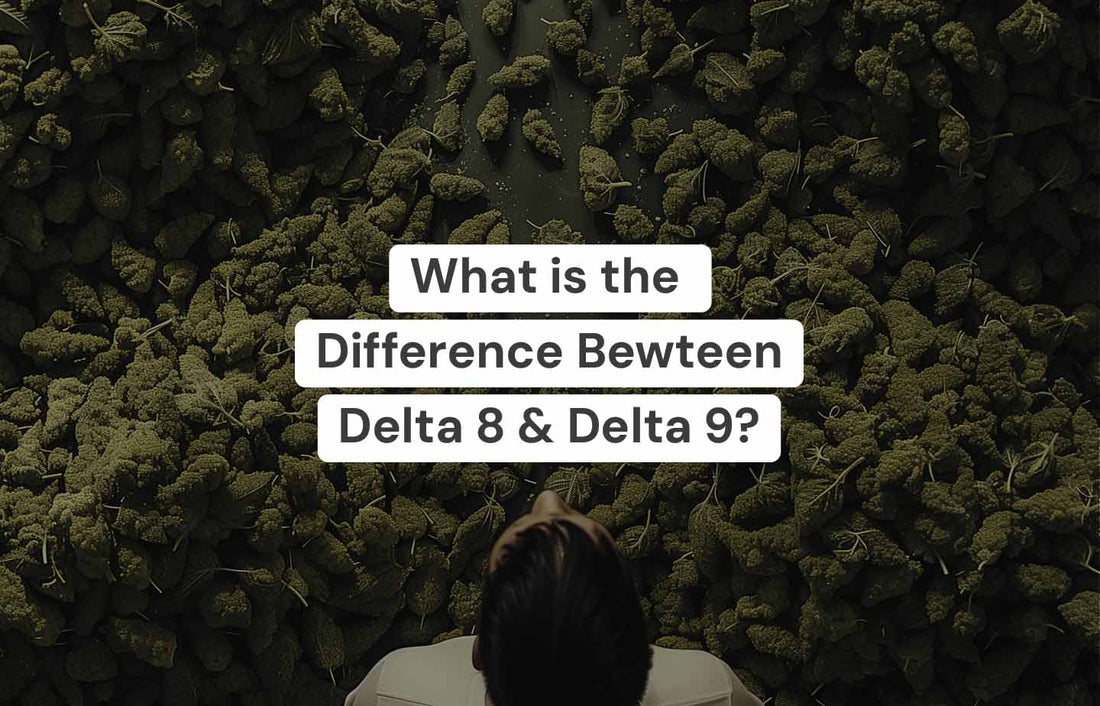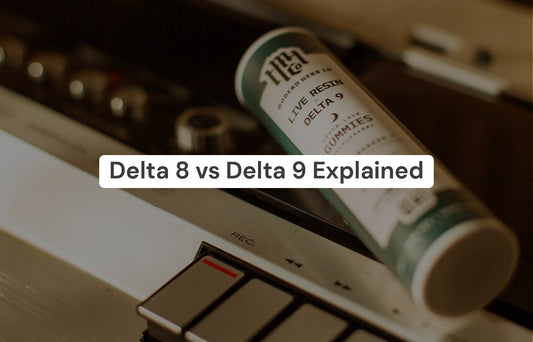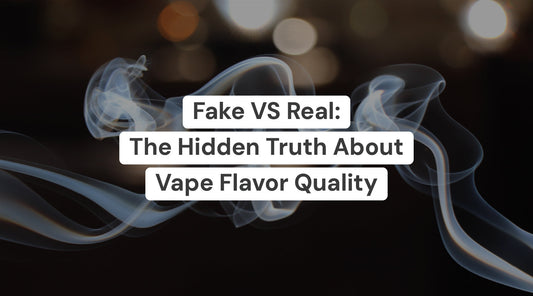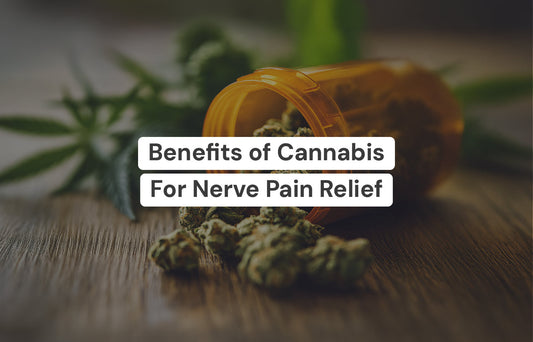
What is the Difference Between Delta-8 and Delta-9?
While delta-8 and delta-9 THC sound similar, they are actually very different cannabinoids. These are two compounds that you’ll find within the cannabis plant, but Delta 8 and Delta 9 products offer something entirely different for the average consumer, making it essential to understand how they compare.
So, what is the difference between delta-8 and delta-9 THC? Let’s find out.
Table of content
What is Delta-8 THC?
Before we start comparing the cannabinoids, let’s first establish what delta-8 and delta-9 THC are as cannabinoids, starting with D8.
Delta-8 THC is one of many compounds found in the cannabis plant. This cannabinoid is psychoactive and can bind to both CB1 and CB2 receptors in the body. In terms of potency, many people describe delta-8 as being a great experience and gentle, making it great for beginners or those seeking more mild results.
The interesting thing about delta-8 THC is that it is considered a minor cannabinoid. This is because the compound is only present in trace amounts within the hemp plant, making it difficult to pick up naturally. Because of this, experts have had to discover ways of synthesizing the cannabinoid.
The delta-8 THC that is made from hemp is converted into delta-8 THC by converting CBD cannabinoids into isomers. Isomerization manipulates the chemical structure of the cannabinoid, turning it from one compound to another.
This means that while delta-8 THC is a natural cannabinoid, the D8 you see on the market today is lab made. However, this allows the industry to offer products of so many different types, including Delta 8 disposables, Delta 8 moon rocks, Delta 8 dabs, and so much more.
What is Delta-9 THC?
Now that we’ve talked a little bit about what delta-8 THC is, let’s discuss delta-9 THC.
There are many psychoactive cannabinoids found in cannabis, but Delta-9 THC is the most abundant. It is present in high percentages, particularly within marijuana. This cannabinoid is famous for its strong psychoactive effects, as it is what gives cannabis the intoxicating results that it is known for.
Delta 9 products offer plenty of supportive results, but they’re most commonly sought after for their blissful, buzzy effects. The effects of delta 9 THC are pretty potent, making it best for consumers seeking powerful outcomes.
As a cannabinoid that’s been popular for quite some time, several Delta 9 products are on the market today. You can buy Delta 9 edibles like Delta 9 gummies or Delta 9 caramels and other options like capsules, flowers, disposables, and more.
Can Delta-8 Show Up on a Drug Test?
When consumers learn about delta-8 THC, they often wonder whether it will appear on a drug test. Unfortunately, the delta-8 cannabinoid can make you fail a drug test. Here’s how.
After you consume delta 8 THC, it breaks down in the body and turns into a metabolite called THC-COOH. Your typical urine drug test looks for this metabolite in the body, as it is the same one that is created after consuming delta-9 THC. Thus, a drug test will pick up the presence of this compound and say you are positive for marijuana, even though delta-8 comes from hemp.
If you know you have a drug test coming up in the near future, it’s best to avoid THC or any THC variants, as they will cause you to test positive. Both delta-8 and delta-9 THC will make you fail your drug test, as will other cannabinoids like HHC or THC-O. Instead, stick to non-psychoactive compounds such as CBD or CBN for the time being.
Delta-8 THC vs. Delta-9 THC: Differences and Similarities
Now that we’ve established what delta 8 and delta 9 THC is, let's cover their most significant differences and similarities.
When it comes to differences, primarily, the three biggest contrasts between the two compounds are legality, potency, and naturality. We will talk more about legality and potency below, but it’s important to recognize that the delta-9 THC you find on the market is natural and not made in a lab. This is because delta 9 is found in abundant amounts within the plant, making it super easy to work with and create delta 9 products of varying types. Thus, there is no lab involvement necessary in terms of synthesizing the compound.
With delta-8 THC, however, this is not the case.
Even though D8 is technically organic and found in hemp, professionals simply cannot work with the minuscule amounts the plant produces. And while labs don’t rely on dangerous chemicals or processes to create the delta 8 cannabinoid, it still requires a lab and the proper professionals to get it right.
Regarding similarities, it’s pretty easy to tell that, based on the names, delta-8 THC and delta-9 THC are both THC variants — and they’ll both get you high.
There is a great deal of similarity between the chemical structures of the two cannabinoids, as well. However, another stark difference between them is where the double bonding happens on the molecular structure itself. On delta-9, it happens on the 9th atom, but for delta-8, it occurs on the 8th. Scientists believe that this slight difference in structure is what makes the potency between delta 8 and delta 9 so different.
Next, let’s get into the differences between the legality and potency of these THC compounds.
Are Delta-8 THC and Delta-9 THC Legal?
Despite their similar chemical structures, delta-8 and delta-9 THC are treated differently in the United States due to their very different legalities.
Delta-8 THC is legal under federal law, while delta-9 THC is not (unless it is derived from hemp). Delta 8 products are federally legal as long as they are hemp-derived and do not contain more than 0.3% THC by weight, according to the 2018 Farm Bill.
Delta-9 THC, on the other hand, is not federally legal in amounts higher than 0.3%. Even if your D9 is hemp-derived, it cannot have more than 0.3% THC by weight. Otherwise, it is federally illegal in the United States. This means that delta-8 products are much more widely available than delta-9 THC products.
The legality of delta-8 and delta-9 THC varies from state to state. Some states have banned delta-8 THC outright, while others have legalized cannabis, which subsequently legalizes delta-9 and delta-9 products. Other places may have delta-8 legal, while delta-9 THC is illegal.
Thus, it’s crucial to check the laws in your area regarding cannabinoids to see what’s legal and what’s not.
Does Delta-9 Get You Higher Than Delta-8?
Delta-9 THC is going to get you much higher than delta-8 THC, and this is one of the biggest differences between the two cannabinoids.
When comparing potencies directly, delta-8 is about half as strong as delta-9. The potency of D9 is said to be roughly double that of delta-8 THC’s potency, making it a better choice for experienced consumers seeking powerful results. On the flip side, delta-8’s more mild strength may be ideal for beginners or anyone with low tolerances. In fact, studies have even referred to delta-8 as delta-9’s “nicer younger sibling.” So, if you’ve been intimidated by the strength of D9 in the past, D8 products may be the way to go.
What is the Recommended Dosage of Delta-8 and Delta-9 Products?
The recommended dosage of delta 8 and delta 9 products is going to vary significantly depending on the consumer and their individual cannabis tolerances. However, considering the strength of these cannabinoids, it’s worth noting that you should likely consume a smaller starting dose of delta-9 than you would of delta-8.
Regardless, a good general rule of thumb for dosing delta-8 and delta-9 is to start low and go slow. This means that you should begin with a low dosage (typically around 5-10 mg for D9 and 10-20 for D8) and see how this affects you. Afterward, you can gradually increase the dosage if the effects aren't strong enough by a few milligrams at a time.
Which Cannabinoid is Right For You?
So, between delta-8 and delta-9 THC, which cannabinoid is right for you? Well, that depends on the effects you’re looking to experience.
If you’re new to the world of THC, it may be best to start with delta-8 THC, as it is more gentle and has a lower overall tolerance. But if you have chronic conditions or a higher cannabis tolerance, then trying delta-9 THC products may serve you and your body better. But it’s simply up to you and what you need most.
Where Can You Buy Delta-8 and Delta-9 Products?
Whether you’ve been searching for delta-8 pre-rolls, delta 8 distillate, delta 8 softgels, delta 8 gummies, delta 8 carts, delta 8 tincture, or even delta 9 edibles like caramels or gummies, The Hemp Collect is the place to buy them.
The Hemp Collect offers a huge selection of high-quality delta-8 and delta-9 products for consumers to choose from. No matter what you’re interested in, The Hemp Collect has an online inventory just for you. Plus, we offer our products at wholesale and bulk pricing as well, in case you want to stock up for your own precious customers.
The next time you’re interested in buying delta-8 or delta-9 THC products, log on to The Hemp Collect and fill out your digital cart. Then, your products will arrive right at your door just a few days later.
Final Thoughts
At the end of the day, it’s clear that delta-8 and delta-9 THC are two completely different cannabinoids, and they offer very different experiences. Before you buy one of these compounds, make sure to take the time to understand which compound is right for you. Then, you can make a purchase right here at The Hemp Collect and experience the best Delta 9 and Delta 8 products around.
Related Post

About Ashley Dellinger
Ashley Dellinger is a trailblazer in the cannabis and hemp sectors, serving as the Director of Innovation at The Hemp Collect. With a keen visionary mindset, she not only propels advancements in these industries but also showcases her versatility as a seasoned professional writer based in Oregon. As a collaborative force, Ashley works alongside leading brands, processors, and retailers to elevate industry standards. Ashley Dellinger's work not only sets new benchmarks but also inspires others to pursue excellence. For a closer look into her insights and experiences, connect with Ashley on LinkedIn, Instagram, and Facebook.
















